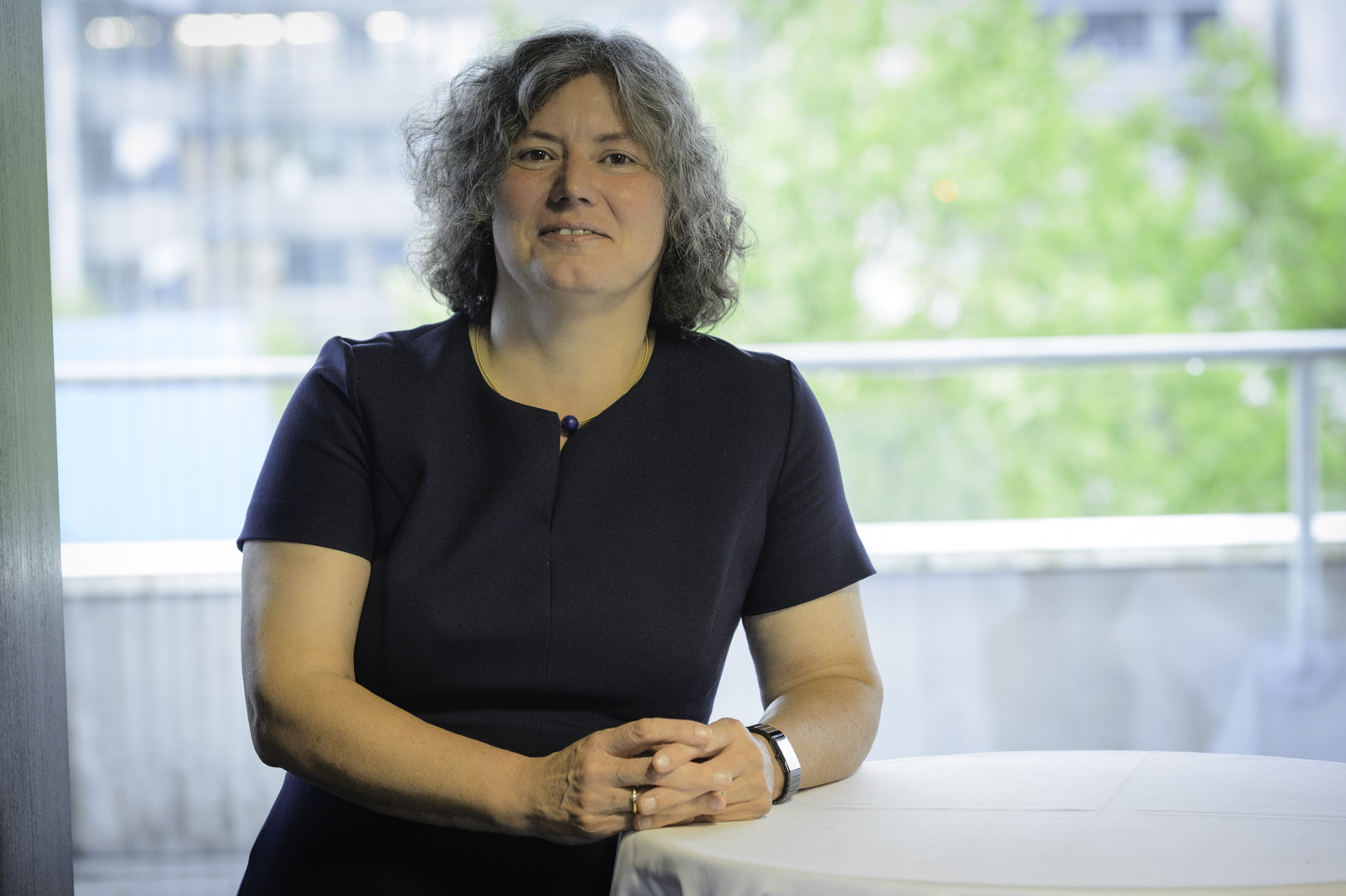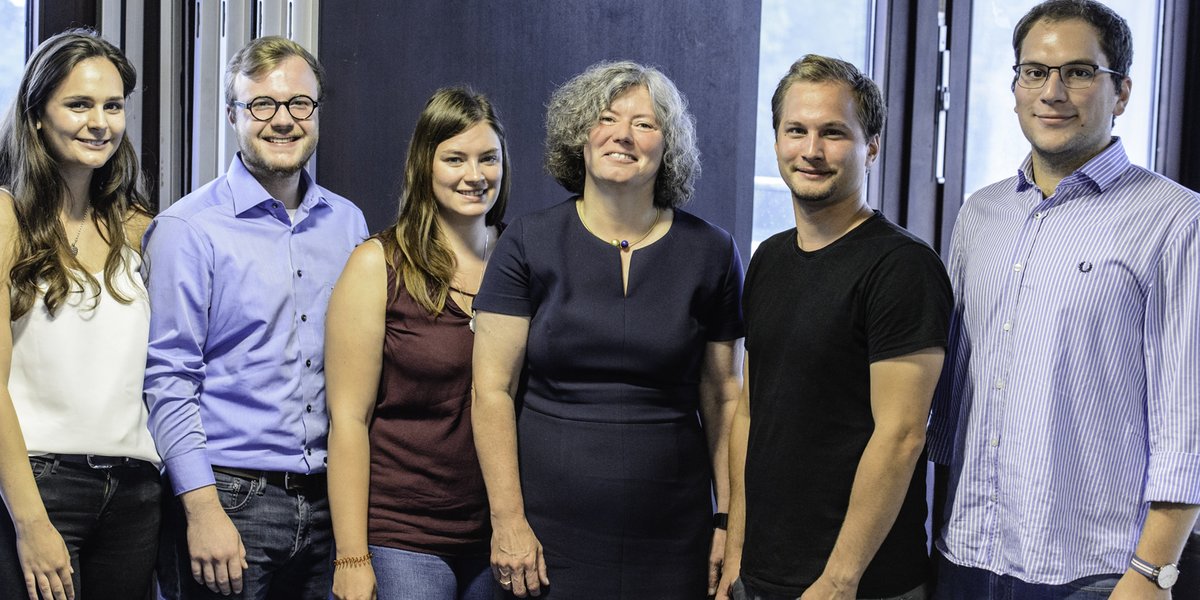
In dialogue
“I’m fascinated by what the university has achieved so far”. The designated rector of the University of Konstanz, Professor Kerstin Krieglstein, shares her plans for the future. She speaks out in favour of cultivating variety when it comes to research funding formats.
On 3 July 2018, Professor Kerstin Krieglstein was elected as the new rector of the University of Konstanz. She will succeed Professor Ulrich Rüdiger, who will become rector of RWTH Aachen University. Dr Maria Schorpp interviewed the outgoing Dean of the Faculty of Medicine at the University of Freiburg shortly after her election by the University of Konstanz’s Senate and University Council. Kerstin Krieglstein will take office on 1 August 2018.
Professor Krieglstein, on 3 July you were elected to become the new rector of the University of Konstanz. How do you feel?
Professor Kerstin Krieglstein: I’m still rather moved. Immediately afterwards, it felt like being in a terrific film that is now becoming reality. At first, the news didn’t really penetrate into everyday life. It was almost like living between two worlds – my daily routine on the one hand and thoughts and memories of this really intense election on the other. It was tremendously exciting.
What were your thoughts of the University of Konstanz before and what made you apply for the position of its rector?
I’m fascinated by what the University of Konstanz has achieved so far. Back in Freiburg, I was particularly aware of its ongoing success throughout the Excellence competition. From a scientist’s perspective, that was impressive news. And the University of Konstanz’s top rankings in the current Funding Atlas of the German Research Foundation (DFG) have just confirmed its outstanding performance level. Typically, universities that succeed in the Excellence Initiative of the German Federal and State Governments tend to be large, widely known institutions with a long-standing tradition. In managing to succeed as a relatively young and small institution, the University of Konstanz has revealed itself to be a true gem, a pearl, something very special.
When you introduced yourself to the university members on 18 June, you said that you wanted to be the university’s advocate, not its custodian. What exactly do you mean?
I’m talking about my leadership style. In my mind, a custodian is someone who formulates his or her own targets and passes them down along hierarchical lines. As the university’s advocate, I rather see myself in a supportive and representative capacity. I will seek to foster and further develop the university’s outstanding potential and to make sure that excellence can thrive here by providing the best possible conditions.
Important decisions for the Excellence Strategy competition are forthcoming. On 27 September, the DFG will announce how many of the university’s cluster proposals have been successful and if the University of Konstanz may compete in the “Universities of Excellence” funding line. What’s your research strategy for the University of Konstanz, irrespective of the 27 September decision?
In principle, I believe that all four cluster initiatives that the University of Konstanz submitted initially reflect its current research performance and excellence. I would want to draw on that and see to it that these joint research projects and topics are realised using a variety of funding instruments. We will have to build on that and see how these research projects adapt and develop further.
On election day in the Senate, when asked about basic and external university funding, you said that while it’s good to have a mainstay, one should also have a joker up one’s sleeve. Can you expand on that?
I was talking about the particularly large amount of external funding that the University of Konstanz receives from the DFG. As a consequence, there are fewer funds coming in from other sources. The DFG is a reliable funding institution that is focused on quality first and foremost and generally open to all research topics. But I believe that we should avoid monocultures. This is also why we should make a significant effort to acquire additional funding from funding bodies other than the DFG, including from those that are not open to any and every topic and type of research. In the future, if important funding institutions such as the Federal Ministry of Education and Research (BMBF) or the European Union invite tenders that are limited to a certain range of topics, we can try to come up with suitable research projects. We should also find out if there are additional funding bodies that we can submit individual proposals to and succeed. This is also a task for the university’s Research Support.
One of the University of Konstanz’s main pillars with regard to teaching is its close orientation towards research. Do you have experience with this and what will be your main focus when it comes to further developing our teaching formats?
I’m a huge proponent of problem-oriented teaching, which I believe enables highly sustainable learning outcomes. It can motivate students to develop an interest in what they’re doing that goes beyond what’s required and to continue looking for solutions to their questions. In my experience, this can be a very effective teaching format. E-learning will play a crucial role in the future. We will have to distinguish very carefully between e-learning tools that provide real advantages and between those that amount to little more than ergotherapy. However, it will be important to include everyday technologies in the classroom – such as the smartphone. It can be used in a variety of didactically useful ways. And by this I don’t just mean sharing podcasts and lecture notes, but rather providing access to self-tests or e-books that can be annotated, for instance.
Prior to your election, you also said that the University of Konstanz should take care to maintain its ability to communicate. What’s particularly important to you in terms of internal university communication?
From what I’ve seen and heard, the University of Konstanz excels at exchanging and discussing opinions very quickly and at passing on information without having to make use of formal channels every single time. That’s terrific. The short distances and open campus structure are a huge advantage. Here in Freiburg, I’m on the twelfth floor of a highrise. I don’t ever meet anyone for casual conversation, except in the lift. People don’t just happen to share opinions, moods or information here.
Can you tell us a little about the causes that you will champion as rector?
There are several, ranging from fostering equal opportunity and diversity via acquiring funding for the university to basic and external funding sources. Digitisation and the data sciences are hugely important in both research and teaching. Then there’s the renovation of the university’s buildings. A 50-year-old university has 50-year-old building stock. We need to come up with a plan sooner rather than later and take care to raise the relevant ministries’ awareness of the situation.
The larger Konstanz area provides fantastic leisure opportunities. Is there anything you particularly look forward to doing when here?
Having spent all my life on firm ground, I think I’d enjoy the challenge of attempting a sailing certificate. In the past, I used to get sea-sick ever so slightly. I guess I’ll have to find out if this might pose an obstacle. Looking at the horizon is supposed to help.
About Professor Kerstin Krieglstein:
Kerstin Krieglstein has been Dean of the Faculty of Medicine of the University of Freiburg since 1 April 2014. She was previously Professor of Anatomy and Chair of the Department of Molecular Embryology as well as Vice-Dean for Structure, Research and Development of the Faculty of Medicine at the University of Freiburg. From 2001 to 2007, she was Professor in and Head of the Department of Neuroanatomy in the area of human medicine at the University of Göttingen. Before that she was Associate Professor of Anatomy at Saarland University from 1999 to 2001.
Kerstin Krieglstein studied chemistry and pharmacy at the Phillips-Universität Marburg and the Ludwig-Maximilians-Universität München from 1982 to 1987. In 1990, she completed her doctoral studies at the Phillips-Universität Marburg before attaining her habilitation (post-doctoral qualification) in the area of anatomy and cell biology at Heidelberg University. She was selected as a Heisenberg Fellow by the German Research Foundation (DFG) in 1998.
For her accomplishments in research and teaching, she was awarded, among others, the Wolfgang Bargmann Prize from the Anatomische Gesellschaft as well as the teaching award for innovative improvements in study programmes with state examinations (Instructional Development Award, IDA). Kerstin Krieglstein is a member of the German National Academy of Sciences Leopoldina and long-standing member in committees of the German Research Foundation (DFG), the Alexander von Humboldt Foundation, the Helmholtz Association, the Federal Ministry of Education and Research (BMBF) as well as the Ministry of Science, Research and the Arts (MWK) Baden-Württemberg (conference of deans).

